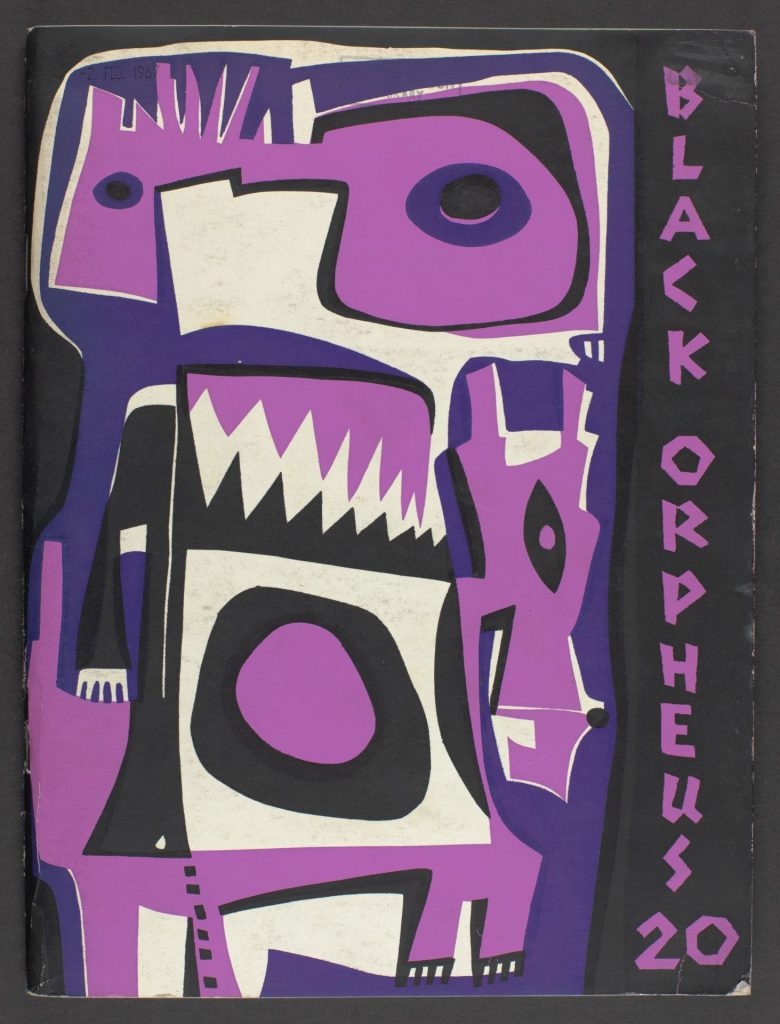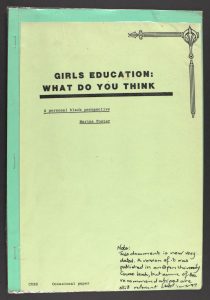Hidden in Plain Sight: Why Liberating our Collections matters
By Sarah S Pipkin, on 20 April 2023
The following is by Rozz Evans, Head of Collection Strategy and co-chair of the Library Liberating the Collections Steering Group. It was originally published in the introduction to our 2023 Exhibition Catalogue “Hidden in Plain Sight: Liberating our Library Collections” and has been slightly edited for the purposes of the blog.

Black Orpehus 20, part of the 2023 Main Library Exhibition
UCL Library Services holds a rich and diverse range of collections containing almost two million printed items (alongside an extensive digital library). These collections comprise both Special Collections (a term that we use broadly to describe our rare books, archives and records) and Teaching Collections. As Head of Collection Strategy, I work closely with our Head of Special Collections, Sarah Aitchison. We are responsible not only for the development, care and curation of our collections, but also for ensuring that we prioritise our effort and resources in the form of money, staff and space. An important aspect of this is our commitment to uncovering the hugely diverse material within our existing collections, enabling us to give a voice to those who have been historically less visible.
As an institution, UCL has been very public about its commitment to addressing issues around Equality, Diversity and Inclusion (EDI) for some years. Arguably the most high-profile work has been around eugenics, UCL’s part in its history and its enduring impact.
However, institutional effort goes far wider than this. For example, UCL was one of the first institutions in the UK to set up its Liberating the Curriculum project in 2016 to improve the inclusivity and diversity of its reading lists. One of the outcomes of this was a community of practice, bringing together colleagues from across the university who are working in this area; this now has a broader remit than the original project.

“Early Efforts by the Misses Moss”
It is this group that inspired the name of our Library Liberating the Collections Steering Group (LLTC), which we set up in July 2020 to plan, monitor and oversee our work in this area. We have developed an action plan based around three key themes of Description and Visibility, Collection Policy and Communication and Engagement.
‘Liberating’ is a term that already has currency in UCL and beyond. It conveys an active approach to this work and its broadness demonstrates how this group is working to uncover, identify and promote a more inclusive collection in relation to all under-represented voices. This means that although there will be specific projects in the realm of decolonisation, for example, the remit is broader than race and racism. We feel strongly that it is important not to use terminology such as decolonisation as a shorthand for wider issues around diversity and inclusion.
UCL Library Services’ collections were initially built from departmental libraries, gifts, donations and bequests, supplemented by some purchases. In the library’s earliest accessions registers it is clear that the focus was on generating teaching collections and filling shelves. This meant that there was no strategic approach to developing a collection, and therefore was primarily reflective of the status of donors. This is very different to how we acquire material today. This involves a much more selective, considered and proactive process, governed by clear and transparent collection policies that are available on our website.

Our newly reclassified copy of “The New Tribe”
This also means that in some cases – particularly in our older material – our collections tend to reflect historic bias and structural inequalities in the university and in the society of the time. These include a normalisation of white, male, Western-centric theories, views, experiences and opinions. This certainly does not mean that we do not hold material which relates to under-represented authors and communities. However, it has become apparent that many of the systems and processes traditionally used by libraries in the curation, management and description of the collections serve to perpetuate systemic bias and can make it difficult to discover this material. For example, the widespread adoption of international cataloguing standards, such as Library of Congress Subject Headings, makes it difficult to challenge or change the use of outdated or discriminatory language in catalogue records.
We are also aware that our collections include content that is now considered discriminatory or harmful, and we must be explicit that its existence in our collections does not represent UCL’s current views.
Traditionally libraries have hidden behind ‘neutrality’ as a way of preserving objectionable content without proper contextualisation, regardless of the harm it can cause to our academic and cultural understanding of these items. However, their historical importance means that we cannot simply remove or delete such items from our collections. Instead we are looking at how we can contextualise such material, acknowledging where necessary the harm these items might do to some of our users and alerting them to problematic content where we can. Pairing re-contextualisation with a celebration of previously ignored voices allows us to have a fuller understanding of our history and culture.

“Girls Education: What do you think?”, part of the Mariana Foster archives collection
Working in this space tends to require a lot of background research and reflection before any work can begin, much less before the books and other materials are made available for use. “Hidden in Plain Sight” does not represent a finished project, but sets the scene for ongoing investigation, discovery and promotion. Staff and volunteers have been working for many months or years, and this will continue to be the case. In the next few years we hope that more of our collections – already full of interesting stories, diverse voices and differing perspectives on colonialism – will be accessible to students, staff and researchers. “Hidden in Plain Sight” is thus a teaser of things to come.
We hope that this exhibition also embodies a spirit of hope and excitement, as well as an ongoing commitment to ensuring that UCL Library’s collections are truly reflective of the richness and diversity of our shared history.
 Close
Close


